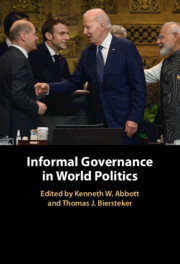Book contents
- Informal Governance in World Politics
- Informal Governance in World Politics
- Copyright page
- Contents
- Figures
- Tables
- Contributors
- Preface
- Acknowledgments
- Abbreviations
- Part I Introduction
- 1 Informality in Global Governance
- Part II Informality of Institutions
- Part III Informality within Institutions
- Part IV Informality around Institutions
- Part V Normative Issues
- Part VI Conclusion
- References
- Index
1 - Informality in Global Governance
An Introduction
from Part I - Introduction
Published online by Cambridge University Press: 23 May 2024
- Informal Governance in World Politics
- Informal Governance in World Politics
- Copyright page
- Contents
- Figures
- Tables
- Contributors
- Preface
- Acknowledgments
- Abbreviations
- Part I Introduction
- 1 Informality in Global Governance
- Part II Informality of Institutions
- Part III Informality within Institutions
- Part IV Informality around Institutions
- Part V Normative Issues
- Part VI Conclusion
- References
- Index
Summary
Understanding contemporary global governance requires a focus on informality. States increasingly govern through informal intergovernmental organizations, transnational public–private governance initiatives, and other informal institutions. Even within formal institutions, informal practices complement or override formal rules. And diverse informal groupings operate in the orbit of governance institutions, framing novel issues and placing them on policy agendas. We address these three aspects of informality – of, inside, and around global governance institutions. We first trace the nature and extent of the shift toward informal governance. We then consider a range of factors that may be driving the shift, drawing on major streams of International Relations (IR) theory; we treat these as candidate explanatory variables. Finally, we summarize the findings on those variables, and other theoretical insights, from the empirical chapters of this volume.
Keywords
- Type
- Chapter
- Information
- Informal Governance in World Politics , pp. 3 - 28Publisher: Cambridge University PressPrint publication year: 2024

